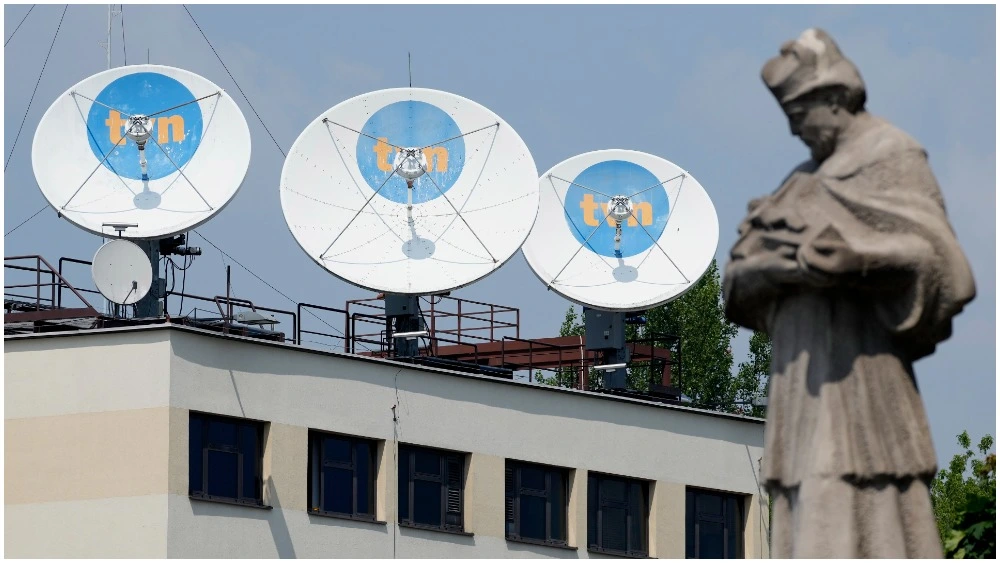New KRRiT Term and New Problems for TVN
serwisy.gazetaprawna.pl | January 11, 2023
Only a hundred days have passed since the new term of the electronic media market regulator began, and the broadcaster headquartered in Wiertnicza street is already in trouble.
At today’s meeting, one of the members of the National Broadcasting Council will demand an explanation of the measures ordered by the Chairman of the Council regarding TVN’s report called Siła kłamstwa.
It is the first meeting of the five-person Council since its Chairman, Maciej Świrski, announced an investigation “to fine the broadcaster” on December 30. This investigation will center around Piotr Świerczek’s report, aired last September on TVN and TVN24, which claimed that the so-called Smolensk subcommittee (the subcommittee on the re-investigation of the 2010 aircraft accident) concealed evidence contrary to the subcommittee’s claim that an attack took place on April 10th, 2010.
Antoni Macierewicz, Chairman of the Subcommittee, has lodged a complaint against the report. On the date the report was aired, Macierewicz issued a statement arguing that “the allegations and pseudo-arguments presented in the report are false and present the Russian viewpoint.”
As the National Broadcasting Council announced, the investigation initiated by Maciej Świrski is to determine, among others, whether the report contains content that violates the Broadcasting Act, namely whether it “promotes untrue information and actions contrary to the Polish raison d’état that endangers public security.”
The spokeswoman for the National Broadcasting Council has not provided any additional information on this matter. We asked the Chairman of the Council, Maciej Świrski, whether, before taking a decision, a resolution of the Council is planned on this matter, but we have not received an answer.
At today’s meeting, Tadeusz Kowalski, the only member of the Council elected by the opposition, intends to request information about the press release issued by the Chairman of the Council and the progress of the investigation against TVN. Until yesterday, it was unclear whether such an item would be added to the agenda: the Council will vote on this matter today.
“However, I believe that the Council should not deal with the report itself, as there is no legal basis for doing so. The investigation which has already been initiated should be discontinued,” says Kowalski. He argues that the rectification for the report can be sought on the basis of press law and, in the event of a problem, the matter can be resolved in court. However, this is not a matter for the National Broadcasting Council.
Regarding fining the broadcasters for infringements of the Broadcasting Act, the law allows the Chairman of the Council to act on his own. However, previous Chairmen made decisions on similar matters based on Council resolutions. This was the case, for example, in 2017, when the Council of the previous term imposed a record fine of PLN 1.48 million on TVN for the coverage of protests in front of the Sejm. Paradoxically, however, soon after the decision based on the Council resolution was issued, the Chairman of the Council, Witold Kołodziejski, repealed the fine on his own.
This was not the only conflict between the regulator and TVN during the previous term of office. In the following years, there were disputes over license renewal, first the license for TVN24 and then the license for TVN7’s film and series channel, which lasted for months.
Next year, the terrestrial TVN will have to undergo such a procedure. The current investigation into the report may influence the re-licensing procedure because, if the act of law is found to have been breached, the broadcaster may not only face a fine but ultimately lose their license.
TVN requested that the investigation into Siła kłamstwa be discontinued, as the network finds it groundless. In its statement, the broadcaster states that the regulator, “instead of upholding freedom of speech,” wants to fine the network television for the disclosure of concealed information.
TVN believes that the investigation by the National Broadcasting Council is groundless. . “Such a fine is aimed solely at limiting journalistic criticism related to the subcommittee’s activities. This is unacceptable in the light of the constitutional tasks of the press, which is obliged to control public institutions,” concluded TVN.
Last week, several dozen Polish editorial offices, including Dziennik.pl, made the report investigated by the Council available. In response to this campaign, Joanna Lichocka, member of the National Media Council and an MP for Law and Justice, tweeted, “the power of media disinformation by the Kremlin regarding Smolensk not only extends to directly post-communist media but also the media run and controlled by Germany.”
On Monday, the European Federation of Journalists (EFJ) called on the National Broadcasting Council to review its attitude towards TVN.


